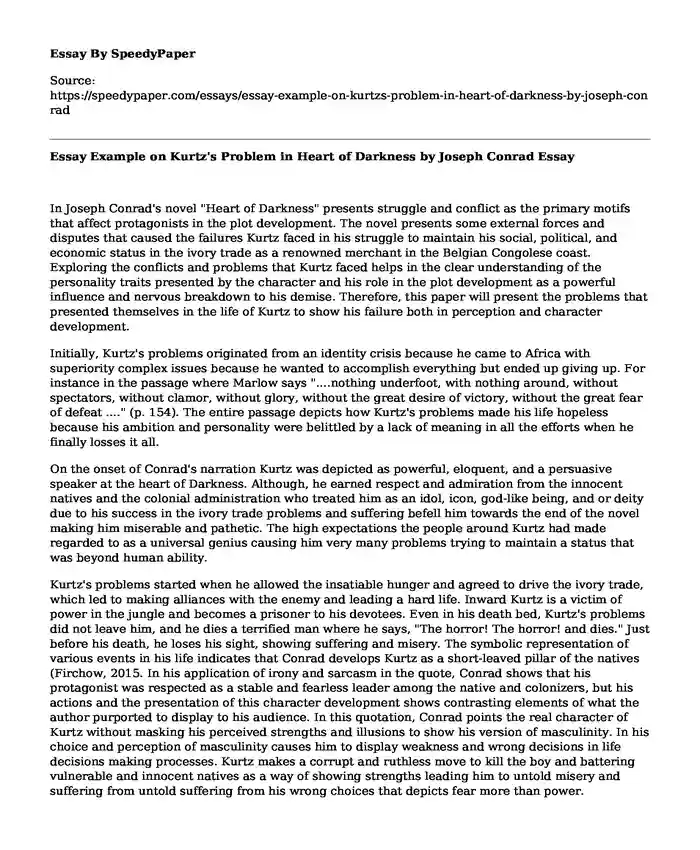
| Type of paper: | Essay |
| Categories: | English literature Character analysis |
| Pages: | 3 |
| Wordcount: | 670 words |
In Joseph Conrad's novel "Heart of Darkness" presents struggle and conflict as the primary motifs that affect protagonists in the plot development. The novel presents some external forces and disputes that caused the failures Kurtz faced in his struggle to maintain his social, political, and economic status in the ivory trade as a renowned merchant in the Belgian Congolese coast. Exploring the conflicts and problems that Kurtz faced helps in the clear understanding of the personality traits presented by the character and his role in the plot development as a powerful influence and nervous breakdown to his demise. Therefore, this paper will present the problems that presented themselves in the life of Kurtz to show his failure both in perception and character development.
Initially, Kurtz's problems originated from an identity crisis because he came to Africa with superiority complex issues because he wanted to accomplish everything but ended up giving up. For instance in the passage where Marlow says "....nothing underfoot, with nothing around, without spectators, without clamor, without glory, without the great desire of victory, without the great fear of defeat ...." (p. 154). The entire passage depicts how Kurtz's problems made his life hopeless because his ambition and personality were belittled by a lack of meaning in all the efforts when he finally losses it all.
On the onset of Conrad's narration Kurtz was depicted as powerful, eloquent, and a persuasive speaker at the heart of Darkness. Although, he earned respect and admiration from the innocent natives and the colonial administration who treated him as an idol, icon, god-like being, and or deity due to his success in the ivory trade problems and suffering befell him towards the end of the novel making him miserable and pathetic. The high expectations the people around Kurtz had made regarded to as a universal genius causing him very many problems trying to maintain a status that was beyond human ability.
Kurtz's problems started when he allowed the insatiable hunger and agreed to drive the ivory trade, which led to making alliances with the enemy and leading a hard life. Inward Kurtz is a victim of power in the jungle and becomes a prisoner to his devotees. Even in his death bed, Kurtz's problems did not leave him, and he dies a terrified man where he says, "The horror! The horror! and dies." Just before his death, he loses his sight, showing suffering and misery. The symbolic representation of various events in his life indicates that Conrad develops Kurtz as a short-leaved pillar of the natives (Firchow, 2015. In his application of irony and sarcasm in the quote, Conrad shows that his protagonist was respected as a stable and fearless leader among the native and colonizers, but his actions and the presentation of this character development shows contrasting elements of what the author purported to display to his audience. In this quotation, Conrad points the real character of Kurtz without masking his perceived strengths and illusions to show his version of masculinity. In his choice and perception of masculinity causes him to display weakness and wrong decisions in life decisions making processes. Kurtz makes a corrupt and ruthless move to kill the boy and battering vulnerable and innocent natives as a way of showing strengths leading him to untold misery and suffering from untold suffering from his wrong choices that depicts fear more than power.
Conclusion
Conclusively, the protagonist critical situation is compromised by his self-perceived elements of masculinity and superiority posing as strong without fear but comes out as very fearful in everything he did. Kurtz puts so much effort to paint his image depicting ironic, and sarcasm in the display of racism, colonialism, and masculinity, which instead portrays the metaphor of fear and insecurity. In the literal application of the motif of concern in the quote helps to depict the contrast of reality and perception of human's self-actualization in character development of the protagonist.
References
Firchow, Peter (2015). Envisioning Africa: Racism and Imperialism in Conrad's Heart of Darkness. University of Kentucky Press. pp. 67-68.
Cite this page
Essay Example on Kurtz's Problem in Heart of Darkness by Joseph Conrad. (2023, Jan 13). Retrieved from https://speedypaper.com/essays/essay-example-on-kurtzs-problem-in-heart-of-darkness-by-joseph-conrad
Request Removal
If you are the original author of this essay and no longer wish to have it published on the SpeedyPaper website, please click below to request its removal:
- Statistics on Pollution in Ports - Free Essay on Environmental Problems
- Essay Example on Adjustment Difficulties in Adolescence
- Essay Sample: Action Taken on John's Class Fighting Behaviour
- Health Information Systems in Schools, Problem Solving Essay Example
- Essay Sample: The Influence of FIFA 2018 on the Quality of Service offered in Russia
- Evidence-based Stress Management, Essay Example for Free Download
- Paper Example. The Injury and Violence Indicators
Popular categories




